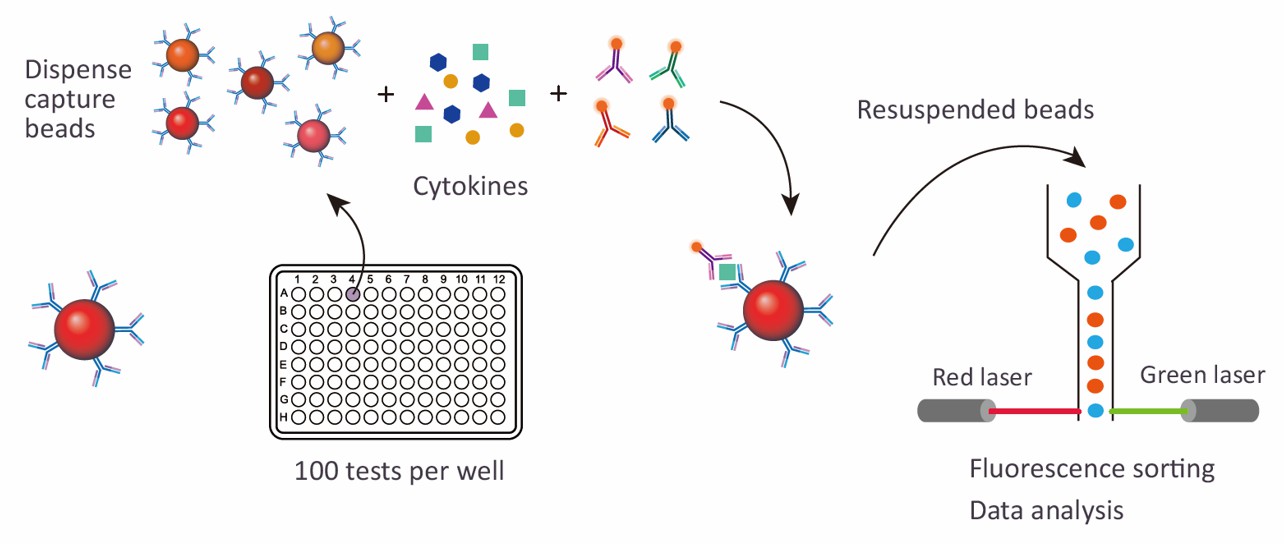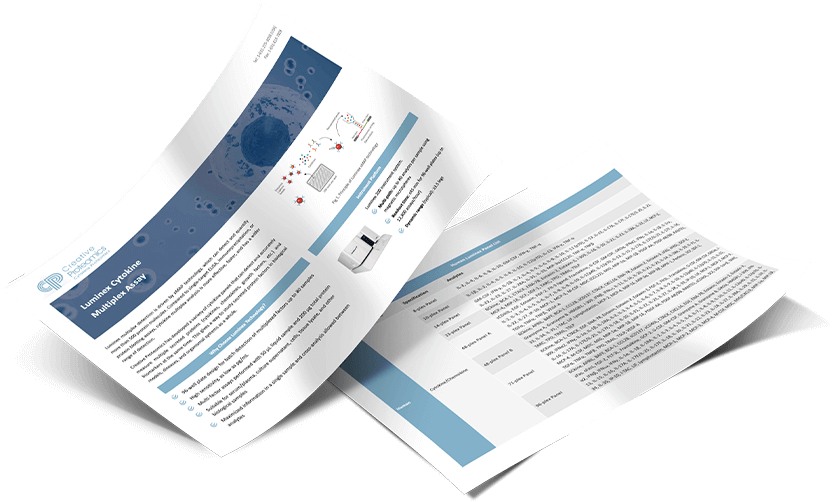- Services Overview
- Analytes Details
- FAQ
What is Exosome Characterization?
Exosomes are small extracellular vesicles, typically ranging from 30 to 150 nanometers, secreted by almost all cell types. They play a crucial role in intercellular communication by transferring proteins, lipids, and nucleic acids between cells. Found in various biological fluids such as blood, urine, and cell culture supernatants, exosomes serve as a window into the dynamic processes occurring within cells and between tissues.
Exosomes are characterized by specific surface proteins that distinguish them from other extracellular vesicles. The most commonly studied markers include CD9, CD63, and CD81—tetraspanins that are integral to exosome formation, stabilization, and cargo loading. Additionally, exosomes may carry internal proteins such as syntenin-1, which is involved in vesicle trafficking, and cytochrome c, a mitochondrial protein that can reflect cellular metabolic states. VLA-4, an integrin important for cell adhesion, is also found on certain exosome subtypes, particularly those involved in immune cell communication.
Understanding the molecular composition of exosomes is critical for advancing knowledge in cell biology and intercellular signaling pathways. By characterizing exosomal proteins and other molecular components, researchers can gain deeper insights into how exosomes mediate processes such as immune modulation, tissue repair, and cellular homeostasis.
Human Exosome Characterization Panel at Creative Proteomics
Creative Proteomics utilizes Luminex xMAP technology, a bead-based multiplex platform that enables the simultaneous detection and quantification of multiple biomarkers from a single sample.
Detection Method
Magnetic bead-based Luminex multiplex assay
Species
Human
Analytes Detected
| Species | Specification | Protein Targets | Applications | Price |
|---|---|---|---|---|
| Human | Human Exosome Characterization 6-plex Panel | CD9, CD63, CD81, Cytochrome c, Syntenin-1, VLA-4 | Suitable for analyzing exosome profiles related to intercellular communication, vesicle trafficking, and cell adhesion. | +Inquiry |
Advantages of the Human Exosome Characterization Luminex Assay
- Comprehensive Analysis: Simultaneously profiles multiple markers, offering a holistic view of exosome content.
- High Sensitivity: Capable of detecting low-abundance markers that may be missed by other methods.
- Minimal Sample Requirement: Requires as little as 50 µL of sample, preserving valuable clinical or research materials.
- Scalability: The assay can be scaled to accommodate large studies, making it suitable for both small research projects and large clinical trials.
- Faster Turnaround Time: Compared to conventional methods like Western blotting or ELISA, Luminex assays provide faster results, facilitating quicker decision-making in research.

Sample Requirements for Human Exosome Characterization Luminex Panel
| Sample Type | Volume Required | Storage Conditions | Preparation Requirements |
|---|---|---|---|
| Serum/Plasma | 50-100 µL | -80°C | Collect in anticoagulant-free tubes; centrifuge at 3,000 x g for 10 minutes to remove cells and debris. |
| Cell Culture Supernatant | 1-2 mL | -80°C | Centrifuge at 3,000 x g for 10 minutes; filter through a 0.22 µm membrane before freezing. |
| Urine | 1-2 mL | -80°C | Centrifuge at 3,000 x g for 10 minutes to eliminate cells and debris. |
| Tissue Homogenates | ≥100 µg protein | -80°C | Homogenize tissue in lysis buffer; centrifuge at 10,000 x g for 20 minutes to obtain protein extracts. |
| Saliva | 1-2 mL | -80°C | Centrifuge at 3,000 x g for 10 minutes to remove cells and debris. |
| Cerebrospinal Fluid (CSF) | 50-100 µL | -80°C | Centrifuge at 3,000 x g for 10 minutes to eliminate cells and debris. |
| Pleural or Ascitic Fluid | 1-2 mL | -80°C | Centrifuge at 3,000 x g for 10 minutes; filter through a 0.22 µm membrane before freezing. |
| Bile | 1-2 mL | -80°C | Centrifuge at 3,000 x g for 10 minutes to remove particles. |
| Breast Milk | 1-2 mL | -80°C | Centrifuge at low speed to separate lipid layers before freezing. |
Application of Human Exosome Characterization Panel
- Cancer Research
Exosomes are crucial in cancer biology, influencing tumor progression and metastasis. This panel enables researchers to identify exosome-derived biomarkers, enhancing our understanding of cancer mechanisms and enabling the study of intercellular communication within the tumor microenvironment.
- Neurological Disorders
Exosomes released from neurons and glial cells play significant roles in neurodegenerative diseases. By profiling exosomal proteins, researchers can explore their involvement in disease pathways, potentially revealing insights into the underlying biology of conditions like Alzheimer's and Parkinson's.
- Cardiovascular Research
Exosomes are involved in processes such as inflammation and vascular remodeling. Characterizing exosomal protein profiles can deepen our understanding of cardiovascular health and disease mechanisms, aiding in the exploration of new research avenues.
- Infectious Disease Studies
Exosomes can influence host responses during infections. This panel facilitates the examination of exosomal roles in pathogen interaction and immune modulation, providing a platform for studying the complexities of host-pathogen dynamics.
- Immune Response Research
Exosomes are critical mediators in immune regulation. Analyzing exosomal markers allows researchers to investigate their roles in immune surveillance and inflammation, providing insights into how exosomes contribute to immune system function.
- Drug Mechanism Exploration
The panel can be utilized to study the effects of compounds on exosomal content, helping to elucidate mechanisms of action and pathways influenced by various treatments. This application can lead to a better understanding of drug interactions at the cellular level.
- Basic Cell Biology
Characterizing exosomes contributes to the broader understanding of cellular communication and signaling pathways. Researchers can investigate how exosomes facilitate intercellular interactions and influence various biological processes.
In addition to preconfigured panels, we also offer customized analysis services. You can customize your own panel through our customization tool, or directly email us the targets you are interested in. A professional will contact you to discuss the feasibility of customization. We look forward to working with you!
| Protein Target | Description |
|---|---|
| CD9 | A tetraspanin protein that plays a key role in exosome biogenesis and cellular adhesion, facilitating intercellular communication. |
| CD63 | A tetraspanin and marker for exosomes, involved in vesicle fusion and trafficking, important for the release and uptake of exosomal cargo. |
| CD81 | Another tetraspanin that is critical for exosome formation and stability, serving as a platform for various protein interactions on the exosome surface. |
| Cytochrome c | A mitochondrial protein that is released during apoptosis, serving as an indicator of cellular stress and an important factor in energy metabolism. |
| Syntenin-1 | A scaffold protein involved in exosome biogenesis and trafficking, linking exosomal proteins to the cytoskeleton and influencing vesicle release. |
| VLA-4 | An integrin associated with cell adhesion and migration, playing a role in immune responses and the interactions between exosomes and target cells. |
How do we ensure the quality of exosome samples during the characterization process?
At Creative Proteomics, we prioritize the integrity of your samples. We use rigorous protocols for sample handling and preparation, including prompt processing and controlled storage conditions. Our laboratory employs differential centrifugation techniques to isolate exosomes while minimizing degradation. Each step is monitored to ensure the highest quality for accurate characterization.
What specific technologies do we use for exosome characterization?
We utilize Luminex xMAP technology, a bead-based multiplex platform that enables the simultaneous detection and quantification of multiple biomarkers from a single sample. This technology provides high sensitivity and specificity, allowing for a comprehensive analysis of exosomal protein profiles.
Can the exosome characterization results vary between different individuals or conditions?
Yes, exosomal profiles can vary significantly between individuals and different physiological or pathological conditions. Factors such as age, sex, health status, and disease state can influence the composition and abundance of exosomal markers. Therefore, it is crucial to interpret results in the context of the specific study population and conditions being investigated.
What factors can affect exosome yield and quality in sample preparation?
Several factors can influence exosome yield and quality, including the source of the sample (e.g., serum vs. urine), the presence of proteolytic enzymes, and the handling procedures prior to isolation. For instance, prolonged exposure to room temperature can lead to degradation of exosomes. It's essential to handle samples with care and process them promptly, ideally within a few hours post-collection, to maintain exosomal integrity.

